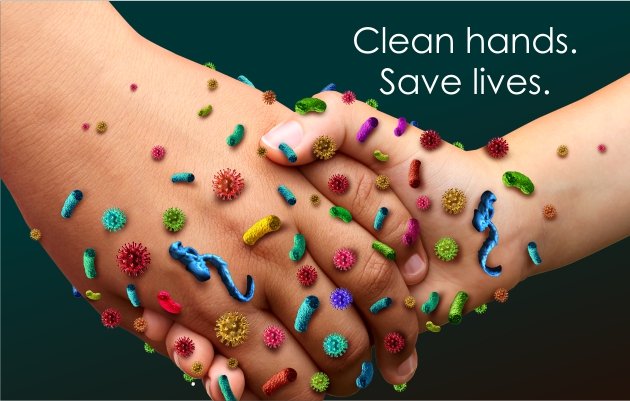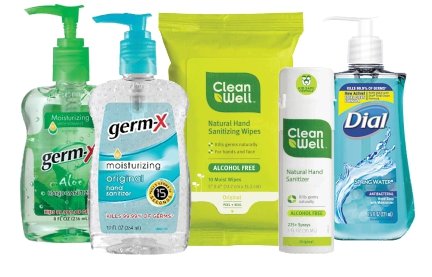

By Stephanie Simons,
Head Pharmacist,
Lindo’s Pharmacy in Devonshire
September is the time of school-time and germs! That’s why the Centers for Disease Control (CDC) organisations, Cleans Hands Coalition, is celebrating International Clean Hands Week from September 16.
We are taught from a young age the importance of washing our hands before we eat, after we have used the bathroom and anytime our hands have got dirty. However, many adults lose this conscientiousness: The Royal Pharmaceutical Society found in 2017 that 84 per cent of British adults don’t wash their hands long enough to clean them of bacteria which can cause infections or viruses and that one in five adults does not wash their hands after using the bathroom and a third don’t before preparing food.
When we don’t wash our hands of bacteria, we leave ourselves open to all kinds of diseases and infections through the transference of fecal, mucus and other matter. This can result in illnesses such as salmonella, norovirus and conjunctivitis. The best way to avoid this is to instill a proper handwashing regimen any time you come into contact with dirty material, so: after the bathroom, after using public transport, after interacting with a sick person and throughout food preparation.
The Royal Pharmaceutical Society recommends that hands must be washed for 20 seconds – long enough to hum “Happy Birthday to You” through twice – in order to effectively remove germs from them. There are also a number of useful guides about the method used to wash your hands, in particular this one from the UK’s National Health Service shows how to most effectively scrub yourself clean in the manner of surgeons.
 At Lindo’s, we stock a wide range of hand-soaps, including natural ones, soaps for sensitive skin and super effective ones, such as Dial’s products.
At Lindo’s, we stock a wide range of hand-soaps, including natural ones, soaps for sensitive skin and super effective ones, such as Dial’s products.
We don’t always have the luxury, though, of having the time or facilities needed to wash our hands the old-fashioned way but that’s where hand sanitiser comes in handy! Portable and effective, a hand sanitiser is a great handbag or desk staple.
When choosing a hand sanitiser, you should look for one that has an alcohol content of at least 60 per cent, that you don’t dislike the smell of – the smell of hand sanitisers can be surprisingly long lasting – and does not include triclosan. Triclosan is an antibacterial chemical but it has recently been the subject of controversy as it may cause harmful side effects.
The CDC recommends that hand sanitisers should have an alcohol content of at least 60 per cent – the higher the alcohol content, the more germs and bacteria are eliminated. Lindo’s stocks Germ-X which is a powerful germ-killing hand sanitiser with an alcohol content of 63 per cent and comes in a range of handy sizes and scents. However, many people find that the high alcohol content in hand sanitiser can result in dry hands or may have sensitivities that that the alcohol can aggravate. To combat dry hands, it is worth investing in a hand cream (such as Nivea Hand Cream). For those who find alcohol-based sanitisers too harsh or for the very young, alcohol-free sanitisers can work, although they may be slightly less effective. CleanWell hand sanitisers are conveniently available as a foam cleanser and in wipe form and are formulated from natural ingredients designed to kill germs and leave hands soft.
When it’s not possible to wash your hands easily, such as when you’re out and about or using public transport – always a hotspot for bacterial transfer – then hand sanitiser is a great second option. Washing your hands will remove the germs from you altogether, whereas a hand sanitiser will kill them. However, there are certain bacteria that hand sanitisers are not effective against, including norovirus.
Using a hand sanitiser or washing your hands regularly can have a positive effect on your health but also on your productivity: a study in 2010 by BMC Infectious Disease Review found that office workers who used an alcohol-based sanitiser five times a day were two thirds less likely to get sick than the rest of their co-workers.
If you have any questions about how to keep your hands cleans or want product recommendations, please don’t hesitate to speak your Lindo’s pharmacist!
Stephanie Simons is the head pharmacist at Lindo’s Pharmacy in Devonshire. She earned her Bachelor of Science in Pharmacy at Massachusetts College of Pharmacy and has been practicing for over 20 years. She is a registered pharmacist with the Bermuda Pharmacy Council and is a member of the Bermuda Pharmaceutical Association.


